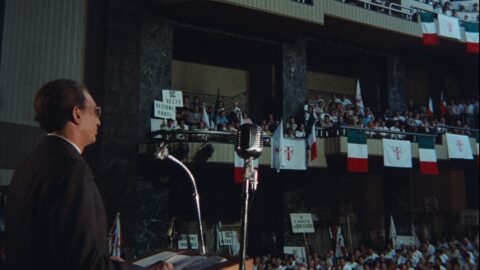There’s plenty to admire in Year One (1974), a resolutely talky, late work from celebrated neorealist Roberto Rossellini, adroitly restored in 4K for Locarno Heritage at this year’s festival. Its commitment to exposition is itself a kind of marvel, presenting an avalanche of domestic scenes where earnest men discuss and dispute the minutiae of internecine conflicts and religious values.
In fact, its demonstration of the so-called didactic method not only posits a cine-version of Brechtian dramaturgy but reveals an influence on one of the great unheralded films of the 21st century, Cristi Puiu’s 200-minute philosophical rumination on the nature of war and Christianity, Malmkrog (2020). I won’t kid you, though; this is likewise a dry, masochistic exercise whose depiction of consensus politics will baffle many contemporary viewers.
Whereas Puiu’s effort was concerned with late-Tsarist Russia, Rossellini’s movie stages the decade following the end of the Second World War and the reconstruction of the Italian state. Specifically, it offers a more-than-sympathetic portrait of Alcide De Gasperi (Luigi Vannucchi), the Christian Democrat who became Italy’s first postwar prime minister, presented here as a tactful and wise centrist navigating the perils of ideological dogma on both the right and the left. We watch De Gasperi’s practical idealism function as a method of deliberation and reconciliation, as a means of drawing together a bricolage of political factions under the banner of unity and antifascism. Officials sternly declare things like: “The old parliamentarism is dead.”
As it plays out within its deliberately limited contours, the drama’s mise-en-scène showcases a range of rooms with participants, usually situated around tables or stood in semi-circles, a languid zoom finding its way among the group. Sometimes De Gasperi appears from a mass of gentlemen, speaking in paragraphs while others listen intently, pensively, reverently. Elsewhere, he blends with the drawing-room backdrop, an equal witness to the tides of history as they ebb and flow around him.
Women in his life are shown to exist predominantly in the home, a dubiously unequivocal reservoir of advice and support. As the years knock on, his hair greys, his brow deepens, and his convictions are tested against a series of critical events: rallies, elections, assassinations. In one eye-catching scene, we observe him twice turn away during a scolding from a coalition partner; beside adamant monologues, moments such as these supply a surprising and arresting theatrical energy.
That Rossellini’s production — made in the style of his history films of the 1960s and 70s — was commissioned by the Christian Democratic Party and partly financed by the Italian state have led inevitably to accusations of liberal hagiography, neatly summarised in Peter Brunette’s intellectual biography of the filmmaker. These claims aren’t without merit: Rossellini treats De Gasperi as a noble, semi-heroic figure who retains his dignity in the amphitheatre of Rome amid successive schemes and machinations. Yet the narrative, while based closely on period sources, offers wry contemplation from its own historical standpoint. One interlocutor, part of a chattering class Greek chorus, extolls the long-term benefits of peace as provided by the atom bomb. To which his compatriot replies: “You only use your head for your hat.”
With some self-awareness, Rossellini also worries about the endless discussion of parliamentary procedure that occludes moral choice and action, “an abstract politics, consisting only of words.” This charge against democracy, popularised by the Nazi jurist Carl Schmitt, has been levelled at European states across the last century and now stalks us into our own. A street scene, somewhat anomalous for its graphic detail and kinetic composition, shows the consequences of the alternative: a crowd is depicted huddling around a newsstand, some remarking that Mussolini and his mistress are dead, others opening a paper to reveal images of corpses from Dachau, Buchenwald and Auschwitz. The timing of this restoration has been lauded for its appeal to “principles of fair justice and unwavering respect for human dignity.” At the very least, Rossellini’s film addresses its past and present with a direct, albeit partial, sincerity. What it forewarns is for us to decide.
Joseph Owen, occasional film critic, is a research fellow at the University of Southampton.





